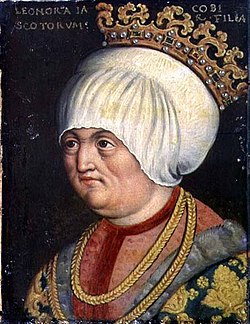Eleanor of Scotland
 From Wikipedia - Reading time: 9 min
From Wikipedia - Reading time: 9 min
| Eleanor of Scotland | |
|---|---|
 | |
| Archduchess consort of Austria | |
| Tenure | 1449–1480 |
| Born | 1433 |
| Died | 20 November 1480 (aged 46–47) |
| Burial | Stams Tyrol, Austria |
| Spouse | Sigismund, Archduke of Austria |
| House | Stewart |
| Father | James I of Scotland |
| Mother | Joan Beaufort |
Eleanor of Scotland (1433 – 20 November 1480) was an Archduchess of Austria by marriage to Sigismund, Archduke of Austria, a noted translator, and regent of Austria in 1455–58 and 1467. She was a daughter of James I of Scotland and Joan Beaufort.[1]
Early life
[edit]Eleanor was the sixth child of James I of Scotland and his wife, Joan Beaufort.[2] James I was known for his great love of literature which he passed on to Eleanor and her sister Margaret.[2]
Starting in 1445, Eleanor lived at the court of Charles VII of France, where it was suggested that she should marry Frederick, King of the Romans.[2][3] In 1447, she accompanied Marie of Anjou, Queen of France, on a pilgrimage on Mont Saint-Michel.[4]
Archduchess of Austria
[edit]In 1448 or 1449 the teenage Eleanor married Sigismund, a Habsburg Duke, then Archduke of Further Austria, and finally ruler of Tyrol (from 1446 to 1490).[2][3] Whilst travelling to her wedding she visited her sister Annabella of Scotland,[5] who was in Savoy due to her contracted marriage to Louis of Savoy, Count of Geneva.[6]
Eleanor served as regent for her husband from 1455 to 1458 and again in 1467.[3] In his absence she raised funds, purchased guns and sought mercenaries for his army and took over the administration of his estates.[7]
Translation
[edit]Eleanor was a great lover of books and became literate in several languages,[3] even though it is likely that she learned German after her marriage.[8] She was able to write in Latin, French, German and Scots.[9]
Eleanor translated The History of the King's Son of Galicia, named Pontus, and the beautiful Sydonia (Pontus and Sidonia) from French to German.[3] The French original passed through several editions between 1480 and 1550.[3] In addition to translating the work, Eleanor also revised it to increase the political power of women.[3] Only the courts with effective female advisors retained their political stability.[3] Based on the number of printings, it was a popular book.[3] A copy of the German translation, preserved in the library of Gotha, bears the date 1465.[4]
In 1473, the German humanist and translator Heinrich Steinhöwel dedicated his paraphrased and translated version of Boccaccio's[10] De Claris Mulieribus (Concerning Famous Women) to her.[8]
Eleanor and Elisabeth von Nassau-Saarbrücken are credited with introducing the prose novel to German literature.[3]
Death
[edit]Eleanor died giving birth to her son Wolfgang at Innsbruck on 20 November 1480.[7] She was buried in the Cistercian Abbey at Stams, Tyrol, Austria.[7]
Gallery
[edit]-
Sigismund, Archduke of Austria and his betrothed Radegonde of Valois and successive wives Eleanor of Scotland and Catherine, Archduchess of Austria.
-
Sigismund and Eleanor Statues in Stams, Tyrol, Austria.
References
[edit]- ^ Weir, Alison (18 April 2011). Britain's Royal Families: The Complete Genealogy. Random House. ISBN 978-1-4464-4911-0.
- ^ a b c d Watanabe, Professor Morimichi (28 July 2013). Nicholas of Cusa – A Companion to his Life and his Times. Ashgate Publishing, Ltd. ISBN 9781409482536.
- ^ a b c d e f g h i j Schaus, Margaret (1 January 2006). Women and Gender in Medieval Europe: An Encyclopedia. Taylor & Francis. ISBN 9780415969444.
- ^ a b Proceedings of the Society of Antiquaries of Scotland. Society. 1 January 1862. p. 95.
- ^ Downie, Fiona Anne (23 October 2006). She is But a Woman: Queenship in Scotland 1424–1463. Birlinn Ltd. ISBN 978-1-78885-342-2.
- ^ Pibiri, Eva. "«A la recherche d'une épouse. Ambassades et voyages autour des fiançailles d'Annabelle d'Ecosse et de Louis de Savoie, comte de Genève (1444-1445)», in L'itinérance des seigneurs (XIVe-XVIe s.), éd. A. Paravicini Bagliani, E. Pibiri, D. Reynard, Lausanne, 2003 (CLHM, 34), p. 123-171". Cahiers lausannois d'histoire médiévale (In French). l'Itinérance des seigneurs (XIVe-XVIe s.). 34: 123–171.
- ^ a b c Panton, Kenneth J. (15 October 2023). Historical Dictionary of the British Monarchy. Rowman & Littlefield. p. 467. ISBN 978-1-5381-7577-4.
- ^ a b Strzelczyk, Jerzy (2010). "The Woman Translator in the Middle Ages. Selected examples of female translation activity". Przekładaniec, A Journal of Literary Translation, English version. 24. Uniwersytet Jagielloński: 19. ISBN 978-83-233-8669-8.
- ^ Worthington, D. C. (2004). Scots in Habsburg Service: 1618 - 1648. BRILL. p. 18. ISBN 978-90-04-13575-8.
- ^ Boccaccio, Poeet Ende Philosophe, Bescrivende van den Doorluchtighen, Glorioesten ende Edelsten Vrouwen (Antwerp, 1525)
 KSF
KSF
